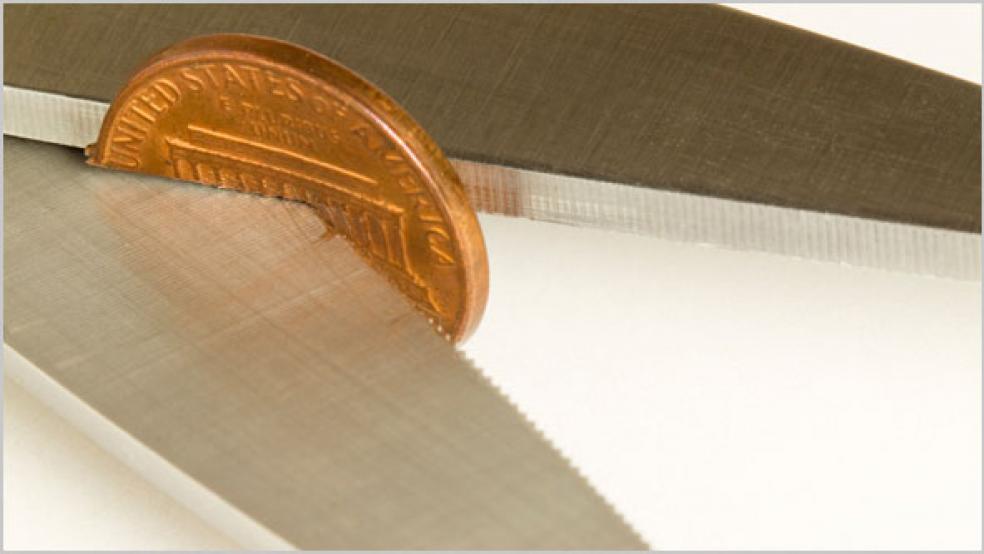Americans are watching their wallets these days. With high unemployment, depressed home values, and a volatile stock market, jittery consumers are thinking twice about spending on everything from groceries to clothing to vacations. Retailers expect holiday buying this year to fall short of last year’s gains as consumers look for discounts and deals.
![]() Businesses face the same issues. The biggest cost savings come from staff reductions and benefit cuts but little things can add up. Grocery bags, ballpoint pens, paper, and even drinking cups all cost money. SuperValu, which operates Albertson’s and Jewel-Osco grocery chains and other stories, estimates that eliminating double-bagging, putting more items in each bag, and using plastic rather than paper bags saves $4 million to $6 million a year. United Continental Holdings, the parent of United and Continental Airlines, says it will save 326,000 gallons of jet fuel a year, or close to $1 million at current prices, by replacing the 38 pounds of manuals and charts pilots carry with 11,000 iPads, not to mention the cost of 16 million sheets of paper.
Businesses face the same issues. The biggest cost savings come from staff reductions and benefit cuts but little things can add up. Grocery bags, ballpoint pens, paper, and even drinking cups all cost money. SuperValu, which operates Albertson’s and Jewel-Osco grocery chains and other stories, estimates that eliminating double-bagging, putting more items in each bag, and using plastic rather than paper bags saves $4 million to $6 million a year. United Continental Holdings, the parent of United and Continental Airlines, says it will save 326,000 gallons of jet fuel a year, or close to $1 million at current prices, by replacing the 38 pounds of manuals and charts pilots carry with 11,000 iPads, not to mention the cost of 16 million sheets of paper.
“The pilots love it,” said Marianne Lindsey, a spokeswoman for Alaska Airlines, which went to paperless flight manuals earlier this year, giving iPads to its 1,400 pilots.
Banks have been especially hard hit by the recession and stock market declines. New York State Comptroller Thomas DiNapoli recently predicted that 10,000 Wall Street jobs will be lost by 2012. Goldman Sachs Group, which has announced a $1.2 billion cost-cutting program that will reduce its 34,000 workforce by 1,000 by the end of the year, recently downsized drinking cups in its New York headquarters to 10 ounces from 12 ounces and eliminated some of the green plants in its London office, saving thousands of dollars a year. The New York Times reported that Barclays, which has said it plans to cut 3,000 jobs this year, recently issued a memo reminding employees that company-issued cell phones are to be used for business purposes only.
Small businesses are finding other ways to cut back. “We haven’t bought pens in this company in seven years,” said James Wong, CEO of Avidian Technologies, a maker of customer relationship management software in Redmond, Washington. Avidian’s 35 employees bring back pens from trade shows and hotels, which Wong estimates saves hundreds of dollars a year. For a company with $5 million a year in annual revenue, that makes a difference. Avidian also cut janitorial services to three days a week and has a barter arrangement with a local caterer, exchanging its software for food at its annual holiday party, which Wong estimates saves the company about $5,000.
Many other companies have also turned to bartering as a way to limit their cash expenditures in a weak economy. “Banks aren’t lending, people don’t have the capital they need,” says Chris Haddawy, chief operating officer of BizXchange, a business-to-business bartering network with more than 2,000 members. Its members include small local businesses and big sports franchises, radio networks, and printing companies, which exchange products and services worth about $4 million a month.
Corporate penny pinching isn’t new, of course. American Airlines may have started a trend back in 1987, when it eliminated a single olive in the salad served to first-class passengers, saving $40,000 a year, according to some estimates. Yes, they served salad on airplanes in the old days. In this economy, you’re lucky to get a small bag of pretzels.

